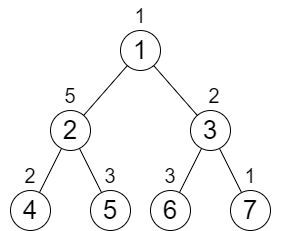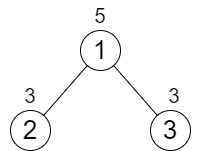You are given an integer n representing the number of nodes in a perfect binary tree consisting of nodes numbered from 1 to n. The root of the tree is node 1 and each node i in the tree has two children where the left child is the node 2 * i and the right child is 2 * i + 1.
Each node in the tree also has a cost represented by a given 0-indexed integer array cost of size n where cost[i] is the cost of node i + 1. You are allowed to increment the cost of any node by 1 any number of times.
Return the minimum number of increments you need to make the cost of paths from the root to each leaf node equal.
Note:
- A perfect binary tree is a tree where each node, except the leaf nodes, has exactly 2 children.
- The cost of a path is the sum of costs of nodes in the path.
Example 1:
Input: n = 7, cost = [1,5,2,2,3,3,1] Output: 6 Explanation: We can do the following increments: - Increase the cost of node 4 one time. - Increase the cost of node 3 three times. - Increase the cost of node 7 two times. Each path from the root to a leaf will have a total cost of 9. The total increments we did is 1 + 3 + 2 = 6. It can be shown that this is the minimum answer we can achieve.
Example 2:
Input: n = 3, cost = [5,3,3] Output: 0 Explanation: The two paths already have equal total costs, so no increments are needed.
Constraints:
3 <= n <= 105n + 1is a power of2cost.length == n1 <= cost[i] <= 104
Related Topics:
Array, Dynamic Programming, Greedy, Tree, Binary Tree
// OJ: https://leetcode.com/problems/make-costs-of-paths-equal-in-a-binary-tree
// Author: github.com/lzl124631x
// Time: O(N)
// Space: O(N)
class Solution {
public:
int minIncrements(int n, vector<int>& A) {
vector<int> maxSum(n);
for (int i = n - 1; i > 0; --i) {
int p = (i - 1) / 2;
maxSum[p] = max(maxSum[p], maxSum[i] + A[i]); // maxSum[p] is the maximum path sum from node[p] (excluded) to leaf nodes.
}
int maxPathSum = A[0] + maxSum[0], ans = 0;
for (int i = 0; 2 * i + 1 < n; ++i) {
int left = 2 * i + 1, right = left + 1, addLeft = maxPathSum - A[i] - maxSum[left] - A[left], addRight = maxPathSum - A[i] - maxSum[right] - A[right];
ans += addLeft + addRight;
A[left] += A[i] + addLeft;
A[right] += A[i] + addRight;
}
return ans;
}
};// OJ: https://leetcode.com/problems/make-costs-of-paths-equal-in-a-binary-tree
// Author: github.com/lzl124631x
// Time: O(N)
// Space: O(N) considering the space overwritten in `A`
class Solution {
public:
int minIncrements(int n, vector<int>& A) {
int ans = 0;
for (int i = n / 2 - 1; i >= 0; --i) {
int L = i * 2 + 1, R = i * 2 + 2;
ans += abs(A[L] - A[R]);
A[i] += max(A[L], A[R]);
}
return ans;
}
};
